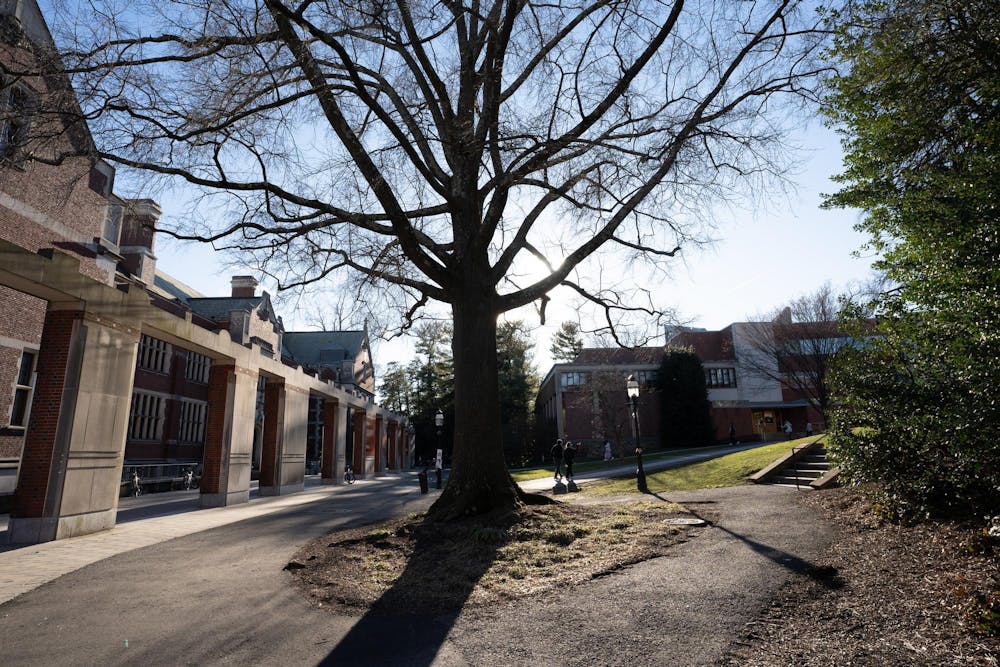My four-year old niece is obsessed with her iPad and she is not alone. Not only are tablets far more common in households with children, but an astonishing 86.6 percent of kids under the age of three exceed the American Academy of Pediatrics’ screen time recommendations. While I fear the developmental consequences of my niece’s early-age exposure to screens, my college-age peers and I should know that we, too, are marred by our current use of technology.
In fact, technology lies at the foundation of understanding the current youth mental health crisis. And yet, there has been no indication that any action addressing the two in tandem has been made at Princeton. It is paramount that University administrators take the national lead in combating digital-driven mental health struggles on campus with improved cultural and pedagogical-focused action.
President Christopher Eisgruber has previously drawn a connection between technology’s growing ubiquity and an epidemic of mental illness: “The relevant question is not whether those differences have changed the way that students learn and live, but rather how they have done so.” This conclusion is well-supported by research that concludes college students with high mobile screen times are more likely to suffer from depression and a worse quality of life. An addiction to digital dopamine, some have suggested, may be the physiological cause behind this relationship.
But rather than — as Eisgruber implored in his 2023 State of the University letter — challenging “its own campus community and pedagogical culture” around how “technology is changing individuals and society,” Princeton has been plagued by inaction.
This is the result of a culture that has made mental health an individual’s onus, and a university that has yet to challenge its current educational approach to technology. Eisgruber has even tasked the very people suffering from this crisis to solve it, calling on faculty, students, and staff to “bring forward new initiatives so that [the] University can address these issues.” But too much time has passed without change, and it is now time for the administration to bring forward solutions.
Many columnists at The Daily Princetonian have expressed many times that serious mental health intervention is lacking on campus. While these voices are right to call out complacency, they have missed the cause of this negligence: Princeton blames mental health struggles on the students experiencing them.
Digital addictions are pervasive, and Princeton’s insistence on leaving students to individually foster a healthy relationship with technology is a disservice to a student body whose experience is deeply connected to their screens.
If technology use is so closely related to issues of mental health, Princeton’s inaction is a direct testament to lacking mental health support as well. Blaming an individual for their mental illness or struggles is not unique to Princeton; this idea has long manifested as the, albeit controversial, psychological issue of “personal responsibility” and can be the result of competitive cultures that pride themselves on their “if you can’t stand the heat, you shouldn’t be here” mentalities.

And while it is debatable whether Princeton experiences either of those examples, what is clear is that the University is silent on how students can practically handle its intersection with technology.
When pressed on the question of academic rigor and mental health, for example, President Eisgruber cited drug and alcohol usage and poor sleep habits as risk factors. What followed, however, was not University policy directed at curbing alcohol and drug consumption, nor improving the sleep habits of students. His answer appeared to merely cast blame.
In fact, during times of high academic stress, like the night before Dean’s Date, the University has acknowledged and arguably encouraged sacrificing sleep for school work by holding events like Residential College Late Night Breakfast, where food and coffee is served. Even sincere attempts to improve mental wellness head-on, like Community Care Day or RCA study breaks, fail to sufficiently disrupt Princeton students’ perpetual academic grind by being optional, supplementary, and sparse.
So when considering technology’s degradation of mental health, it appears here, too, will students be left to fend for themselves. But this cannot be the case.

The digital world has become inseparable from the lives of Princeton students and the rest of the world. Most students use online learning tools in their routine academic experiences and Princeton encourages its professors to digitize their pedagogies. I spend hours every week sifting through and responding to emails, scouring the internet for research, reading Canvas notifications, and writing assignments on my laptop.
Little has been done to reconcile the inseparability of these healthy uses of technology from the more insidious ones. It is also known that effective mental health interventions from technology — like consistent access to green spaces and sunlight, as well as short-term digital detoxes — are often impractical or inaccessible: reunions tents and fencing, and major construction can block off green space and a genuine digital detox would be impossible on a Canvas and email dominated campus. Princeton students should not be expected to work out these dilemmas on their own.
Some progress has already been made at Harvard University’s Derek Bok Center for Teaching & Learning, which has released some initial recommendations for managing technology as a distraction in the classroom. When I Iooked through the McGraw Center for Teaching and Learning’s website, I could not find a comparable resource. Princeton has a responsibility to its students to go further: to seriously engage with its campus culture and pedagogy to recognize technology’s impact on mental health as a crisis, and solve it.
Christofer Robles is the Community Opinion Editor and is a junior in the Comparative Literature Department. He can be reached at cdrobles[at]princeton.edu or cdjrobles on ‘X’.








